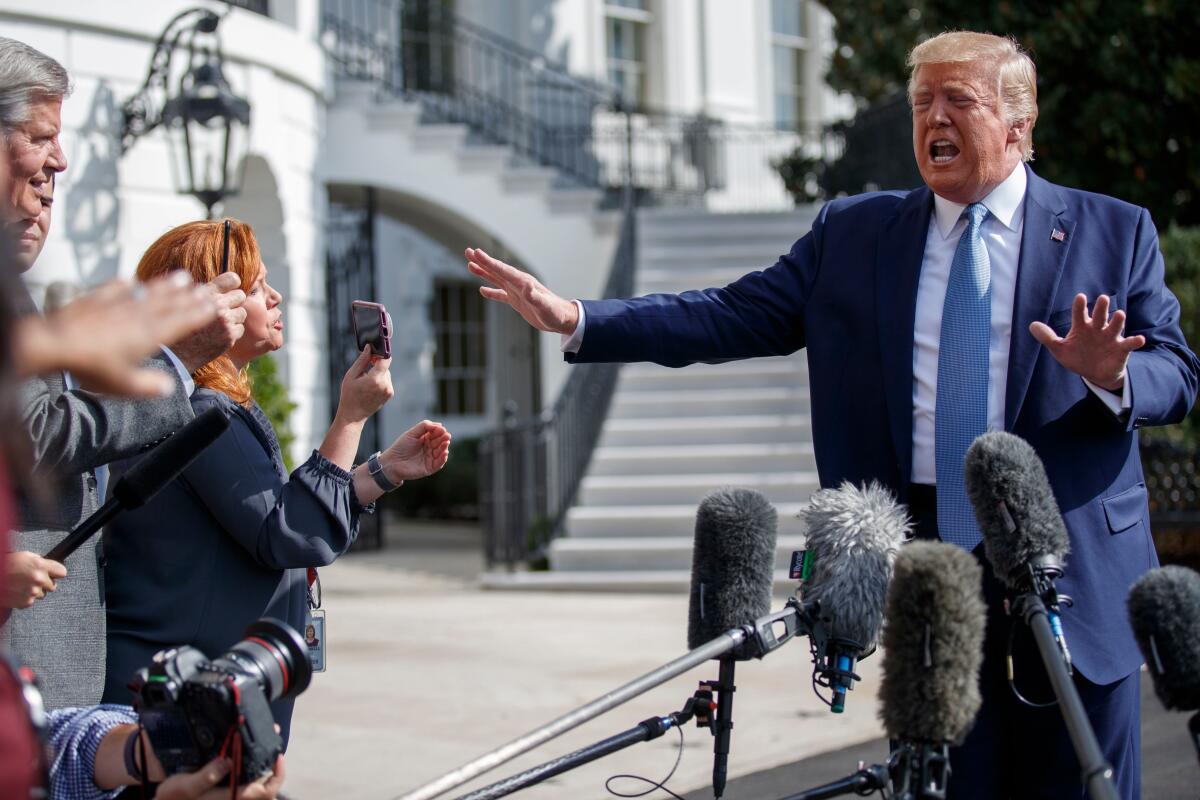Letters to the Editor: Why ‘investigate’ Trump when he openly asked China and Ukraine for help?

- Share via
To the editor: The U.S. government spent more than $30 million in an attempt to determine whether President Trump’s campaign colluded with the Russian government in its effort to influence the 2016 election. My assumption was that such collusion is illegal. (“Trump urges China to investigate Bidens despite impeachment inquiry,” Oct. 3)
Now, I am confused. In the last week, Trump has publicly confessed to asking both Ukraine and China to investigate Joe Biden, the former vice president and leading Democratic candidate for president. This is clearly Trump admitting that he is trying to get foreign nations to affect the outcome of a future U.S. election.
Why aren’t we simply proceeding with the collusion prosecution of Trump?
Owen Keavney, Pomona
..
To the editor: The president seems to love investigations. His demand for Ukraine to investigate the Bidens is based on what exactly? A whim? Anger that someone else’s kids might be making money off their last name?
In reality, the president is addicted to trumped-up conspiracy theories, the birth certificate nonsense being one among so many. So why is he objecting to an investigation by Congress looking into what appears to be actual wrongdoing? Maybe Trump cannot abide an inquiry that has real merit?
His obstruction of investigations may or may not be an impeachable abuse, but it is certainly a strategy to bury whatever the truth is. Perhaps the president wants to hide even exculpatory evidence because he sees political hay to be made in playing the victim. It keeps him in the spotlight on cable, and he can keep it going by tossing the occasional grenade amid the gaggles of talking heads.
Whatever his justification, the American people should not accept the role of being a con man’s mark.
Carl Selkin, Pasadena
..
To the editor: Many opinions on the possibility of Trump being impeached base their conclusions on more recent proceedings, such as those of Bill Clinton and Richard Nixon. One would be wise also to remember the rarely mentioned impeachment of President Andrew Johnson in 1868.
Johnson faced a similar political climate, as an unpopular president against a vehemently partisan Congress. Johnson was impeached by the House for a relatively minor violation, and the Senate acquitted him. This first impeachment set a powerful precedent: Convicting a president could have dire consequences and should be undertaken only as a last resort.
After he was acquitted, Johnson still went on to bid for his party’s presidential nomination, but he was not successful. The question, then, is if Trump avoids conviction by the Senate, will he nominated by the Republican Party?
Randall Arms, Long Beach
More to Read
A cure for the common opinion
Get thought-provoking perspectives with our weekly newsletter.
You may occasionally receive promotional content from the Los Angeles Times.










